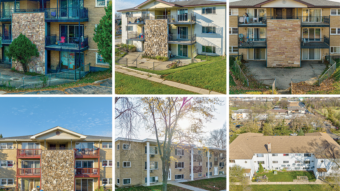Finance is the hot topic industry-wide, and while much of the concern has to do with volatile economic factors, it’s more so the lack of clarity surrounding them. Everyone has different opinion regarding what might or might not happen, but to find a solution, it’s important to look at the macro picture.
Illinois Real Estate Journal recently spoke with Patrick Tuohy, Senior Vice President at Marquette Bank, to discuss the past, present, and future as it relates to multifamily finance.
Past
Before joining Marquette Bank 40 years ago, Tuohy managed interest rate and equity risk for Merrill Lynch, after which he decided to hone in on middle-class business. Why? It’s these markets that are poised to weather economic downturns and they’ve done so, Tuohy said, since 1982.
To save money in the event of an economic downturn, Class A renters tend to move to Class B and Class B renters move to Class C, and so on. The opposite happens when it turns back around: Class D moves to Class C, Class C moves to Class B and Class B moves to Class A, exemplifying an unwavering demand for middle-market buildings.
Yet COVID-19 affected all sectors, not just multifamily, and it was hotels, restaurants and entertainment venues that were most directly impacted. To assist the owner/operator during this period, Marquette Bank gave the option of interest-only loans, which turned out to be very successful, meaning no defaults, and business were able to get back on their feet as the world transformed into our new normal. At the same time, $4 trillion was printed and spread around the U.S. in an effort to keep the economy from crashing.
But the future effects of this were misread, and inflation isn’t transitory as predicted. Inflation skyrocketed in 2022 as the pandemic moved toward an end, resulting in multiple 75-point basis point jumps. Rates in the last 60 days have jumped to 5.5–6% after hovering between 3.5–4% for the last decade, Tuohy said, and a big consequence, as it relates to the multifamily market, is a disconnect between the bid, the ask, the offer and the sale.
Present
Sellers are still wanting the inflated value for their building, based on a rate of 3.5–4%. A buyer, at this rate, could put 25% equity down and have adequate cash flow to operate the building plus a decent return—but this is not possible at the adjusted rate of 5.5–6% and today’s buyers must put down 30–40%, resulting in a disconnect between the buyer and seller. Because of this, the multifamily volume in Chicago and across the U.S. has decreased considerably for potential sellers, but Tuohy said there is still a large buyer pool because the money is there, and buyers willing to shell out additional equity for the right building in the right location.
Tuohy said the same is happening within the single-tenant, triple net market, as well.
Future
No one is certain how or when this stalemate, of sorts, will go back to normal, but Tuohy said it’s only a matter of time. Sellers will have to sell at some point—for some reason—and as the economy slows and we enter a recession, rates will again reach a low- to mid-4%.
The is-it-isn’t-it recession is a topic of conversation itself, but for clarity, one must look at the fundamentals.
The U.S. is 70% consumer driven and when consumer sentiment, which is still fairly strong, starts to decline rapidly, the average consumer starts to cut back on nonessential items like electronics. When this happens, manufacturers stop buying chips, and Tuohy said it’s for this reason that the chip industry is usually the first to feel the burn in times of financial uncertainty. In a credit-driven economy, when credit card rates exceed 20%, a consumer will think twice about putting debt on their balance sheet.
But consumer behavior is less predictable following COVID-19. People have not lessened their spending on luxuries like dining out and traveling, leading to an effect on other markets like single-family, and homes have dropped 70–80%. Like multifamily, Tuohy said with a mortgage of 3.5–4% or lower, homeowners have no incentive to sell just to buy a new home at a rate of 6%, ultimately leading to a mortgage industry layoff.
It’s a domino effect, and it starts with the housing industry, as the backbone of our economy. When people are hit pause on homebuying, they’re also slower to buy furniture, appliances, etc.—all affected by increasing rates.
“It’s a very slow process, and we’re still waiting to see,” Tuohy said. “Interest rate hikes set in motion a domino effect, but we’re only in the first stage.”
And then there’s inflation, which is affecting replacement costs for multifamily. In fact, Marquette Bank saw the cost of construction increase 20–30% for new projects, impacting the underlying value of apartment stock.
The average cost to replace a single unit in Chicago is $400,000 and in Chicagoland, $250,000.
“If existing apartment stock is half of that cost,” Tuohy said, “it makes for an attractive investment long term. Buying an apartment unit for $250,000 or $300,000 in Chicago is significantly less than the cost of replacing that building when you factor in the cost of materials and labor.”
The same goes for single-family homes: Marquette Bank has 18 three-bedroom, two-bathroom townhomes under construction, for which prices recently jumped 25% on construction costs, turning $290,000 into $370,000. In turn, Marquette had to raise the price to around $490,000, yet they still sold.
That to say, everything is interconnected. Across the U.S., replacement costs of single-family has a direct effect on the rental market, and the cost of replacing or building a home affects whether people can afford to buy—and the difficulty of this transition has only solidified the multifamily market, as the vacancy rate is less than 5% in Chicago.
And while it’s true that rental rates are being increased due to renters being priced out of the housing market, Tuohy said there’s another side to the equation. Insurance costs are up 7%, utility costs are up and taxes have increased, as multifamily is looked at as a go-to sector to raise taxes because of the perception that there is more profit being made.
“We have buildings that doubled in taxes this year from $40,000 to $80,000,” Tuohy said. “Because of these things, the margins have shrunk, and the owner/operators have to pass a portion of that cost onto the tenant. It’s no longer a matter of whether or not landlords want to raise rents—they have to just to break even.”
Multifamily is not a “get rich” business, Tuohy said, but a very slow and challenging ride, now more so than ever. “It works well for people long term,” he said, “but it’s not for those seeking a short-term return.”




